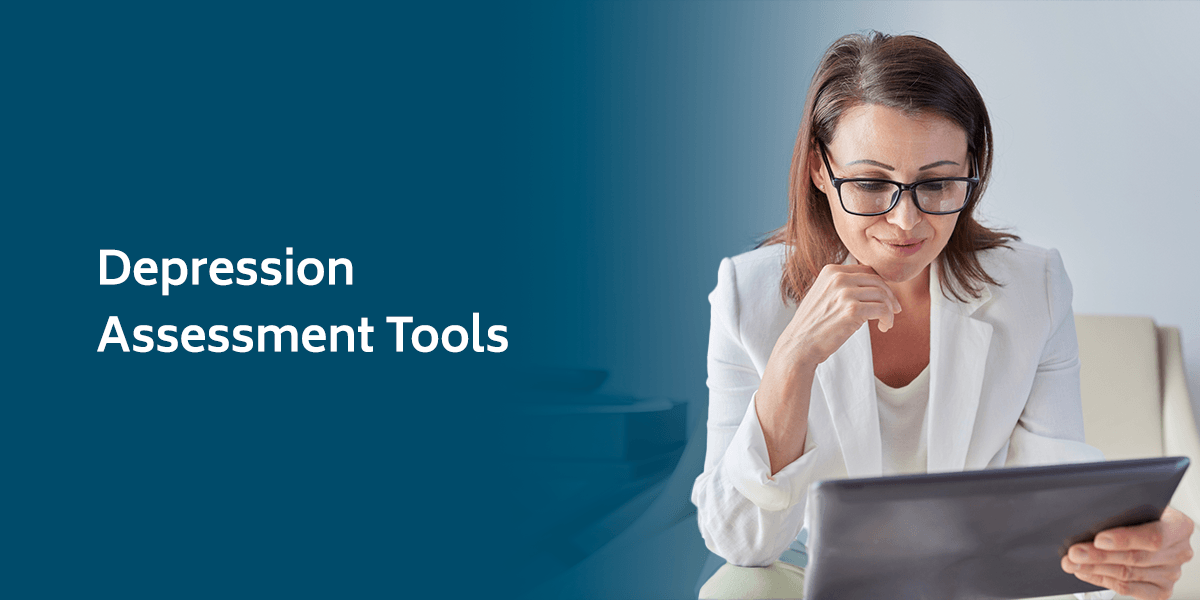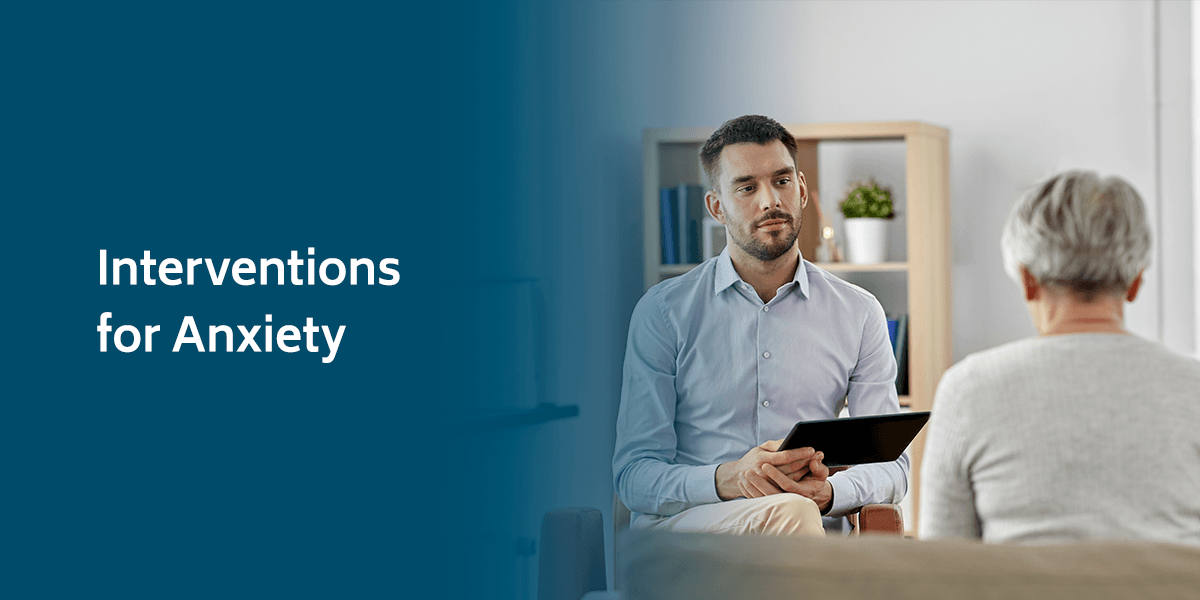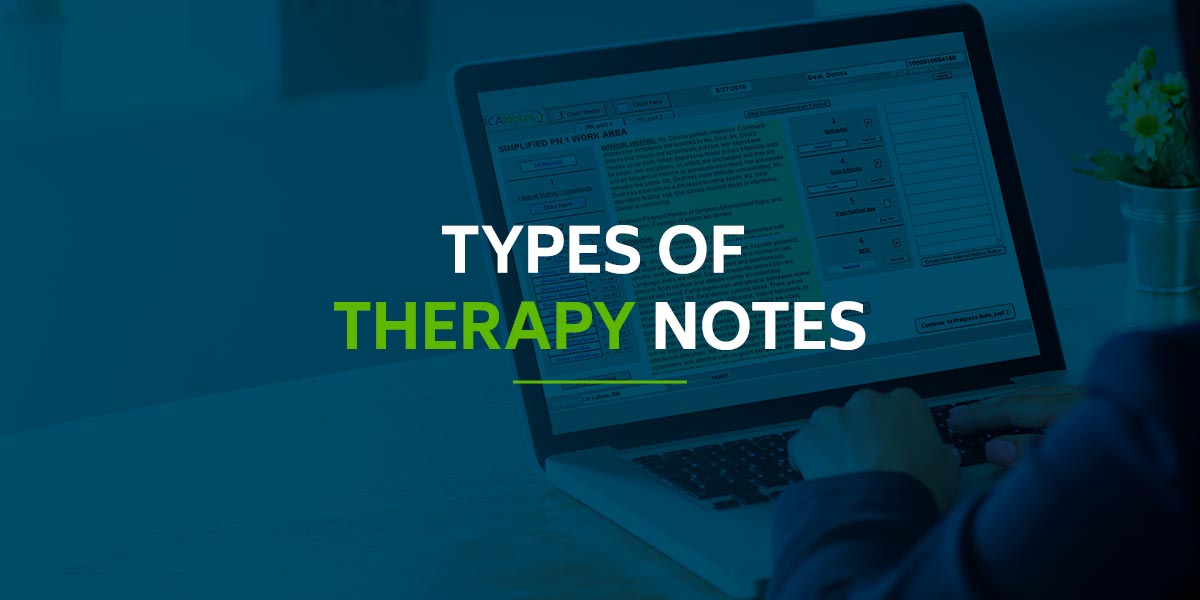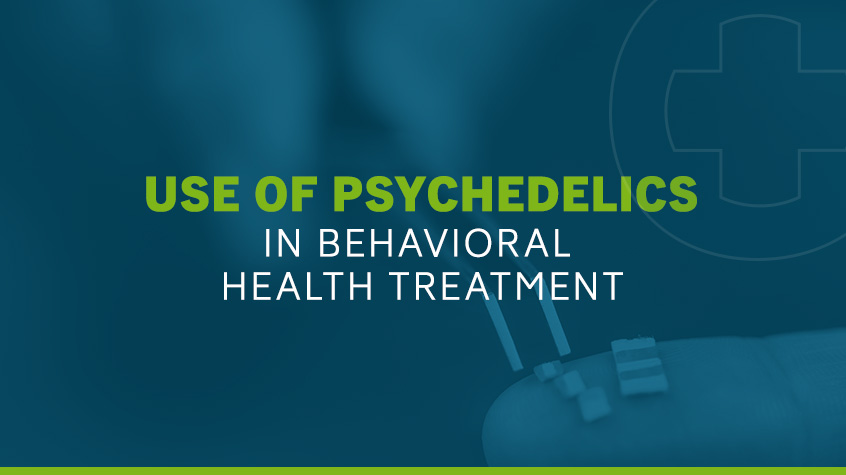Ketamine in Psychiatry
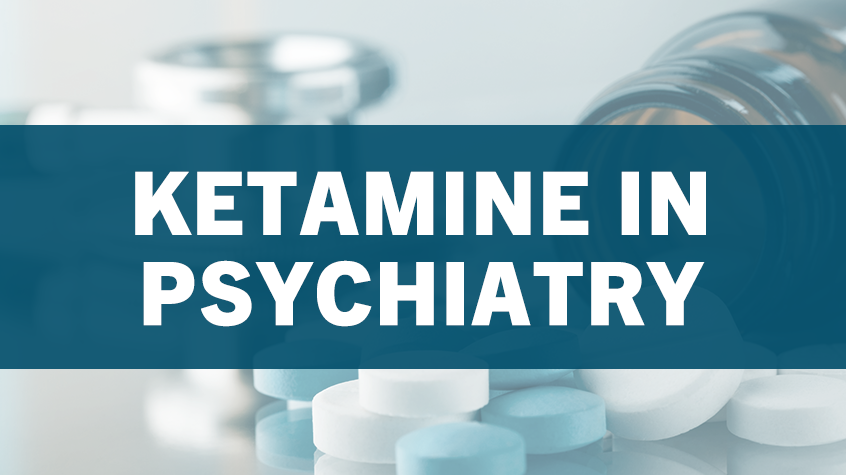
Depression is one of the most debilitating mental disorders around the world. For the first time in over 25 years, there is potentially a new way to treat depression. Ketamine has been in the medical world for decades, though it's only recently been considered as a treatment option for severe depression and suicidal thoughts. As ketamine treatment becomes more common, what do you as a mental health professional need to know about it?
For a deeper dive into ketamine in psychiatry, consider checking out our webinar, "Special K" in Psychiatry.
Depression in Today's World
Globally, depression is one of the most common mental health disorders. Depression continues to rise across the world, and it's estimated that about 280 million people suffer from depression. During the COVID-19 pandemic, the percentage of adults who reported experiencing depressive symptoms increased to over 41%. To be diagnosed with major depressive disorder, a patient must display at least five symptoms within a two-week period. Some of the most common symptoms include:
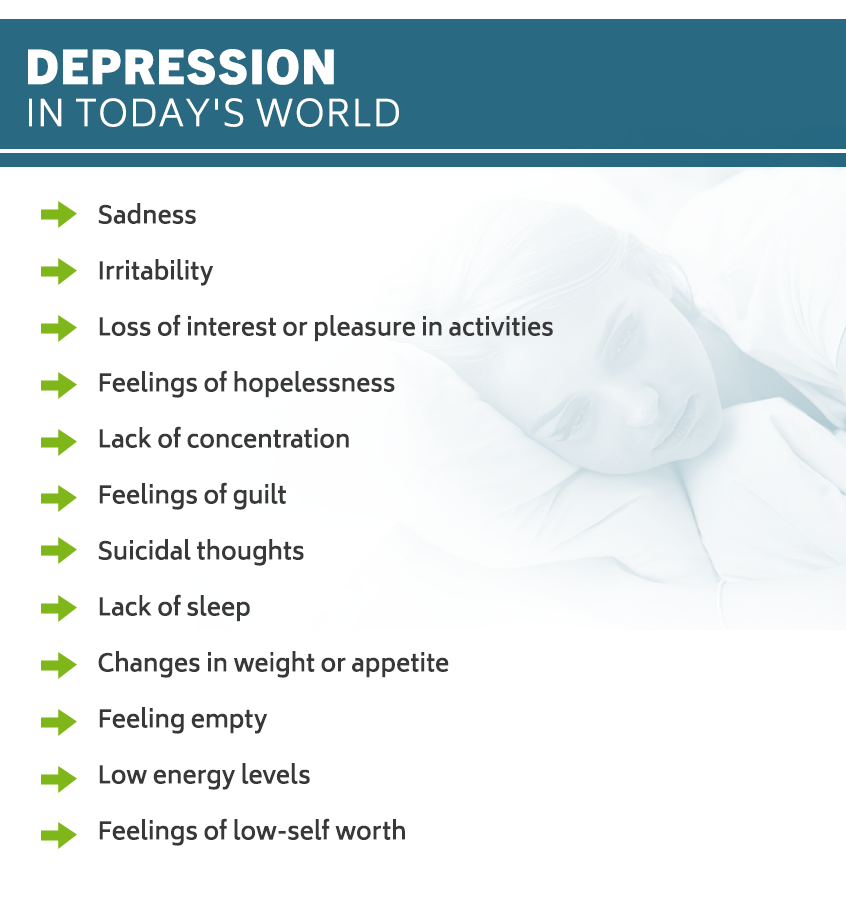
- Sadness
- Irritability
- Loss of interest or pleasure in activities
- Feelings of hopelessness
- Lack of concentration
- Feelings of guilt
- Suicidal thoughts
- Lack of sleep
- Changes in weight or appetite
- Feeling empty
- Low energy levels
- Feelings of low-self worth
Depression makes it difficult to function socially and personally with family, education, work and more. Depression is categorized as being mild, moderate or severe, depending on the severity of the symptoms and their impact on the patient's ability to function in important areas of life.
Mental health professionals are tasked with finding effective treatments for their patients with depression. This is a challenge for mental health practices across the world because each person's brain chemistry is different, so there's no "one size fits all" treatment solution for everyone. It often takes a combination of current depression treatment practices to help patients find relief.
Current Depression Treatment Practices
Fortunately, there are treatment practices that help reduce, and in some cases eliminate, depressive symptoms in patients. Most commonly, depression is treated with medications and therapy. In severe cases, patients are often hospitalized for their own safety.
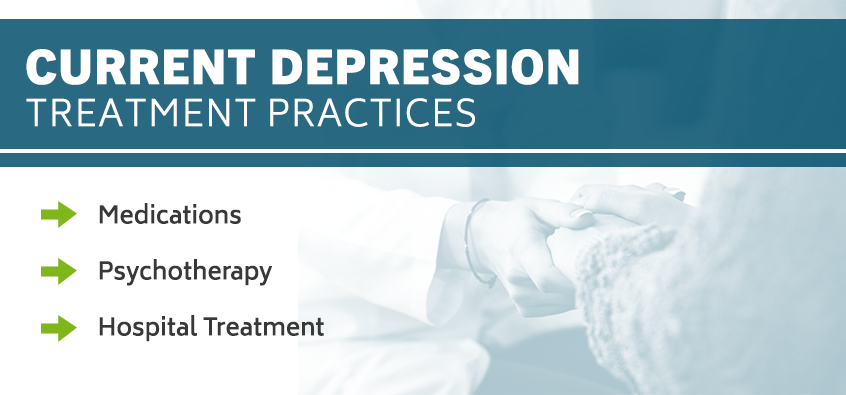
Medications
When clinicians are prescribing medications for their patients, the chosen medication will have a higher chance of being effective if the patient's preferences, past experiences and characteristics are considered first. It's important to pick medications and treatments specific to each individual patient. Considering a patient's experiences and characteristics when prescribing them a medication can help you narrow down the best options. For example, if your patient has trouble sleeping in addition to their depression, you may prescribe a medication that is more sedating.
Unfortunately, medications are very much a trial-and-error process to find what combination might work for each individual patient and their brain chemistry. This is because measuring the brain is difficult to do without being invasive. When choosing a medication, you have to go through the process of picking one and going back to try a different one if the first is ineffective.
Psychotherapy
When patients participate in psychotherapy, they meet with a mental health professional with the goal of identifying what may trigger their depression and ways they can work through it. This treatment practice helps patients gain a stronger understanding of their emotions, helps them feel like they're regaining control over their lives and teaches them coping techniques. Therapy can be highly effective, especially when paired with medication.
Hospital Treatment
Hospitalization is an effective treatment option for patients who have severe depressive symptoms. In cases where the patient has suicidal thoughts or feelings, they become a risk to themselves and potentially to others. When this is the case, it's often safer for a patient to spend time in the hospital where they can receive supervision. Some patients may also choose hospitalization if their symptoms are preventing them from eating, sleeping or bathing properly.
Hospitalization can be intimidating for patients, though it's extremely beneficial for those who are at risk of harming themselves.
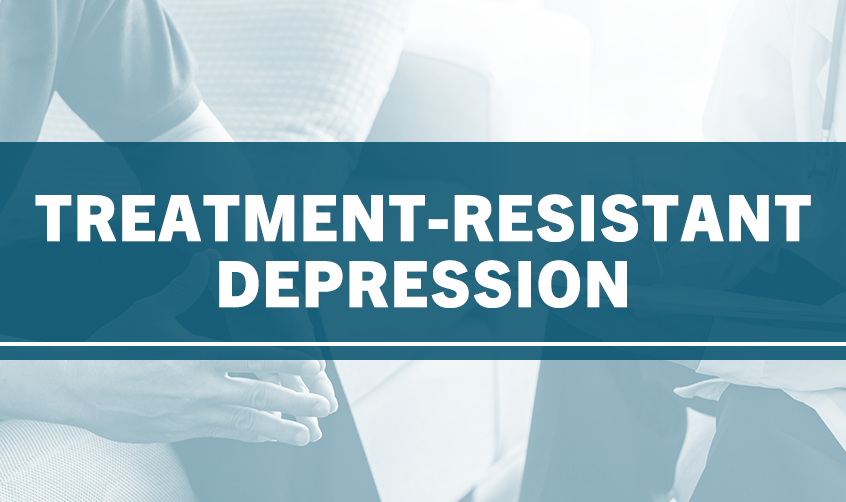
Treatment-Resistant Depression
Although depression treatments can be effective for many patients, one-third of major depressive patients experience treatment-resistant depression. While treatment-resistant depression is not defined in the DSM 5, it means the patient does not respond to at least two standard antidepressant treatment options after an adequate duration at an adequate dosage. Until recently, when this was determined in a patient, there wasn't much mental health clinicians could do besides trying different medications and treatments.
In August of 2020, the FDA approved the use of ketamine in treating treatment-resistant depression and suicidal ideations. This treatment option can reduce symptoms of depression in as quickly as a day or two. This is significantly faster than other medication options that typically take several weeks to start providing relief. The potential for ketamine to be used in treating depression could finally help provide relief to the patients who have yet to find a treatment that works for them.
For treatment-resistant depression, ketamine has to be administered as an IV infusion. Strong relief typically won't be immediate — many patients need a couple of doses before seeing improvement. Receiving ketamine treatment is a time-consuming process. In ketamine studies, patients received infusions 2-3 times a week for about a month. The ketamine is administered over the course of 40 minutes. After receiving the dosage, patients are required to be monitored for at least two hours to ensure stable blood pressure before leaving.
Many patients went into remission after four weeks on doses of ketamine, making it a great option for emergency depressive patients. While research shows that ketamine can provide effective short-term relief, it's unfortunately not a long-term solution. There are still many questions regarding the efficacy and long-term side effects of treating depression with ketamine.
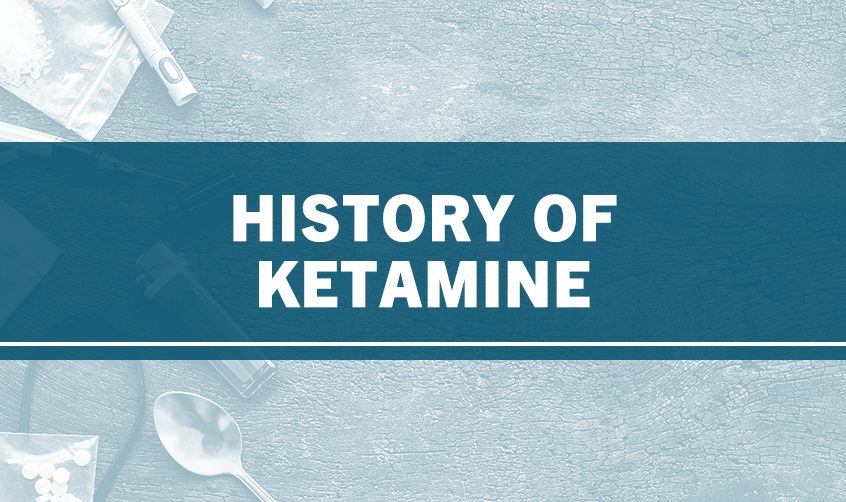
History of Ketamine
To better understand what ketamine is and what it's been used for, let's explore its history. In 1962, Dr. Calvin Lee Stevens, a pharmacist and chemist, synthesized ketamine. In 1970, the FDA approved ketamine as an anesthetic agent, and there haven't been any other FDA-approved indications for actual ketamine since then. Anesthetics act on the brain to suppress sensory responses, which is what gives ketamine the potential to suppress depressive symptoms into remission.
Ketamine has a similar chemical structure to the dissociative hallucinogenic drug phencyclidine, more commonly known as PCP. Ketamine's dissociative state effects led to recreational use of the drug after its approval in the 1970s. The dissociative effects and increased recreational use are ultimately what led to the restricted dosage of ketamine. This led the Department of Health and Human Services (DHHS) to file for ketamine to be a controlled substance in 1981, though the Drug Enforcement Administration (DEA) didn't do so until 18 years later in 1999.
While ketamine has a generally short duration of action, it's still one of the most widely used anesthetics for humans and animals. Ketamine is approved for safe use in hospitals as an anesthetic, though prolonged use will likely lead to tolerance, addiction and dependence. Despite lacking FDA approval, ketamine is being prescribed off-label for patients with depression and other mood disorders. The American Psychiatric Association (APA) warns that the lack of available data and the drug's potential risks should be highly considered before ketamine is prescribed.
Ketamine's Efficacy in Treating Depression
While there are still a number of unanswered questions, researchers and doctors are gaining a better understanding of the efficacy of ketamine in treating depression. Researchers are looking at the possibility of ketamine being able to help stimulate chemical releases and even act as certain chemicals. For example, it may be possible that ketamine can help activate dopamine firing and help increase the release of dopamine in the brain. Dopamine helps regulate mood, and if patients are showing a dopamine imbalance, ketamine could help.
Ketamine has the potential to be extremely beneficial for treating depression. Of course, a lot remains unknown, although ketamine infusions are already helping some patients find relief.
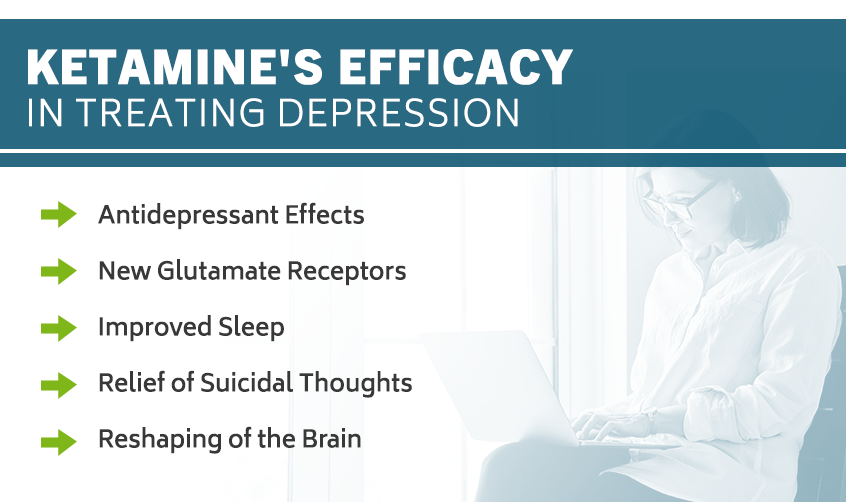
Antidepressant Effects
Many patients with treatment-resistant depression or major depressive disorder experience significant relief for the first time in their lives after receiving a ketamine infusion. After feeling powerless under years of depression and other related symptoms, patients feel as though they've gotten their lives back. Ketamine's antidepressant effects minimize the symptoms of depression to help patients feel lighter, happier and less stressed.
New Glutamate Receptors
Research also suggests that ketamine can help the brain make new glutamate receptors. Glutamate is a neurotransmitter that brain cells use to communicate about moods. Some people who have depression have weakened glutamate receptors, making it difficult for the brain to make those nerve connections. With the help of ketamine, glutamate receptors strengthen, and the brain can build new receptors to help improve cell communication.
Improved Sleep
Because ketamine helps patients experience improved depression symptoms, they're able to sleep better at night. Getting enough sleep has positive effects on the brain, and this can help depression patients deal with their symptoms more effectively.
Relief of Suicidal Thoughts
Ketamine is often used to sedate patients who have just been rescued from a suicide attempt. Doctors began to suspect that ketamine has effects on suicidal thoughts because some patients would report a decrease in suicidal thoughts months after receiving the drug. Patients who often have suicidal thoughts can potentially find some relief with ketamine.
Reshaping of the Brain
Some patients with depression lose synapses or connections in their brain, likely due to the level of stress that depression puts on the brain. Research shows that ketamine can help these synapses regrow. The patient will experience strong antidepressant effects as they regrow more synapses.
Potential Side Effects of Treating Depression With Ketamine
Before prescribing ketamine as a treatment method, it's important for a mental health professional to consider its potential side effects. A patient's response to ketamine treatment largely depends on the state their brain is already in. This consideration means everyone can have a different response to the treatment, just as with any other depression treatment medical professionals may prescribe.
Because this is a fairly new treatment method and there is so much research yet to be done, one of the downfalls of treating depression with ketamine is that there's a lack of data on the potential long-term side effects. There have been small, short-term studies conducted, but there is no controlled long-term data. Listed below is what is currently known or suspected of ketamine's side effects.
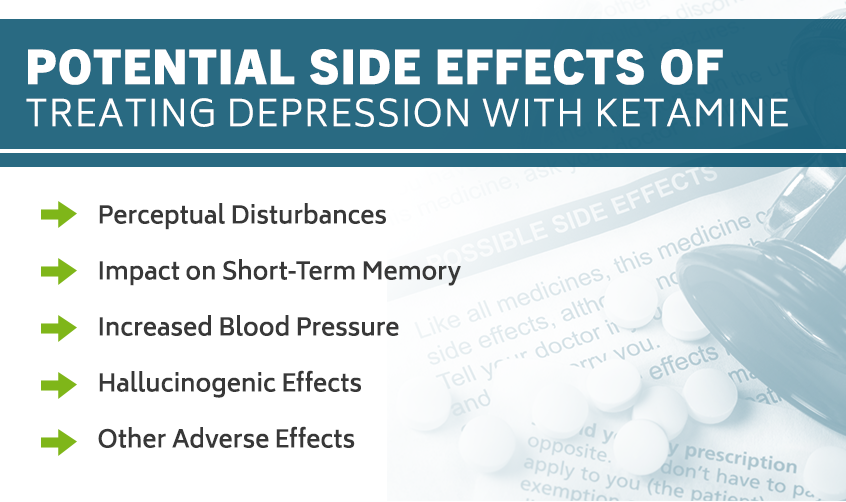
Perceptual Disturbances
Ketamine infusions may have effects on a patient's perception. For example, they may feel as though time appears to slow down and speed up, or colors, light and noises may become overstimulating. This side effect is typically experienced during the infusion and should become less noticeable soon after the administration.
Impact on Short-Term Memory
Memory impairment is an area of concern because it is a side effect of recreationally using ketamine. Anesthetics have amnesic properties, which makes them great for surgeries. Recreational ketamine users can experience negative effects on their memory, so it's possible for depression patients to experience this ketamine treatment symptom as well.
Increased Blood Pressure
Ketamine infusions can increase a patient's blood pressure. Patients receiving infusions are required to be monitored afterward because of this side effect. Research shows that blood pressure rises throughout ketamine administration and returns to normal during monitoring. While this side effect can be insignificant for many patients, people with high blood pressure should be cautious.
Hallucinogenic Effects
One of the biggest side effects of ketamine is its potential hallucinogenic effects. During administration, patients may experience hallucinations, delirium, confusion, dissociation from their identity or body and difficulty thinking. Much like the perceptual effects, the hallucinogenic effects typically wear off soon after the infusion is complete. Patients with other diagnoses like schizophrenia should be extremely cautious with this treatment, as the hallucinogenic effects of ketamine could worsen their other symptoms.
In some cases, discontinuation of ketamine treatment is required for some patients who experience psychological distress during treatment. The research studies showed that ketamine's hallucinogenic effects likely caused this distress. Be sure to consider this side effect before prescribing this course of treatment for your patients.
Other Adverse Effects
Some other common side effects of ketamine usage include:
- Drowsiness
- Dizziness
- Blurred vision
- Poor coordination
- Agitation
- Behavioral changes
- Nausea
- Involuntary muscle stiffness or movement
There are potential side effects with every drug, and each patient will respond differently to these symptoms. While there are often cases where the benefits outweigh the risks, ketamine's side effects should be highly considered before a patient receives the treatment, especially because ketamine infusions are not yet FDA-approved.
Improve Patient Experience With ICANotes
Advancements in the mental health field help mental health professionals like you better serve their patients. Regardless of the patient symptoms you're treating, using electronic health record (EHR) software like ICANotes can help to improve their experience with you. ICANotes is a comprehensive software system that helps you write therapy notes, organize charts, manage your practice and securely communicate with patients. When you streamline your clinical content, you can spend more time treating patients and growing your practice.
To see how ICANotes can work in your practice, request a free trial today. For more information about ICANotes features and capabilities, contact our support team today.
Sources
- https://www.cdc.gov/mmwr/volumes/70/wr/mm7013e2.htm
- https://www.who.int/news-room/fact-sheets/detail/depression
- https://www.bigmarker.com/icanotes/SPECIAL-K-IN-PSYCHIATRY
- https://adaa.org/sites/default/files/Ketamine%20JAMA%20Journal%20Article%20-%20Charlie%20Nemeroff.pdf
- https://www.webmd.com/depression/features/what-does-ketamine-do-your-brain
- https://pubmed.ncbi.nlm.nih.gov/29525051/


